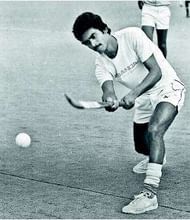Today the streets and by-lanes of Benaras will be ringing out with the words, “Arrey!! Shahidji?? Kya kamaal ke dribbler they woh...”.(what a brilliant dribbler he used to be). As the nation mourns the death of the undisputed genius of dribbling, Mohammed Shahid, we cast a look back on an illustrious career that brought India the highest honour on the Olympic stage. A prolific manipulator, he along with legends like Zafar Iqbal and M. M. Somaya were the reasons one sat down with rapt attention to watch a game of hockey in the 1980’s. One can’t help but feel nostalgic recollecting the golden era of Indian Hockey.
Humble Beginnings
Born on 14th April 1960, in Varanasi, Shahid grabbed eyeballs with his first appearance for India playing for the Junior Team at the Junior World Cup in France. This was followed by an exemplary performance in the Agha Khan Cup which resulted in a call-up to the Senior National Team under the captaincy of Vasudevan Baskaran for a four-nation tournament in Kuala Lumpur.
It was the start of a decorated career when he repaid the faith of the selectors by notching up a Player-of-the-Tournament performance while bamboozling the defense of World Champions Pakistan who boasted the legendary centre-half Akhtar Rasool.
Playing Style
Shahid’s (who played left in) partner-in-crime left winger Zafar Iqbal describes him as, “From running at great speed, Shahid used to stop like an engine getting seized and dodge the rival defenders. The Europeans were clueless about him…I was lucky to play with him.”
In Baskaran’s words, “It’s not easy to describe Shahid’s movement on the field. [He] used to evade defenders with an incredible body twist- a rare quality that can’t be taught or imitated.” Such was his reputation that Baskaran was afraid that he (Shahid) would drive defenders to the point of desperation that they would hit him. In fact an encounter with Pakistani legend Hassan Sardar nearly led to blows due to Shahid’s cheeky dodges beneath his legs.
No amount of training camps or elite coaches could recreate that inimitable flick of the wrists which seemed to be a subtle extension of the hockey stick. Physicality was never a demand of the Indian Hockey circuit then and Shahid, with his short, lithe, sinewy frame used his pace and flexibility to his full advantage to feign, flit in and out between players leaving a tangle of defenders aghast at his genius.
Deceptive Genius
His principle job on the team was not to score but to draw in defenders to create space for the scorers to freely move about in the penalty areas, as Baskaran explains, “You can’t borrow elegance, Shahid was born with it. I used to play the role of a feeder and once I passed the ball to Shahid, you could only watch him dribbling past the opponents. It was like a computer game where all the programmes are set beforehand.”
Performance in the Blue shirt
Shahid belonged to that last generation of players whose name and faces could still clearly be associated with their action on the field of hockey, before the arrival of cricket as a major competitor for national air-time. Part of the team that notched up a Gold Medal in the 1980 Moscow Olympics, the last gold for India in hockey, he went on to win a Silver medal at the 1982 Asian Games (courtesy of an infamous 7-1 thrashing at the hands of arch-rivals Pakistan) and a Bronze at the 1986 Asian Games in Seoul.
His playing style and charisma inspired future legends like Dhanraj Pillay to take up the sport. After hanging up the national jersey, Shahid retired to his hometown of Varanasi in order to serve in the Railways, an institution he had represented in his playing days as well and one which stood by him steadfastly in his last battle against pneumonia-related complications.
Somehow the image of him weaving in and out of Benaras’ narrow lanes while deftly sidestepping obstacles is an ode to the livewire player he was in his youth. India, today, lost not only one of the greatest players ever to don her jersey but an inspiration to thousands of youth that you can conquer the world with a hockey stick.

